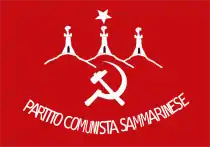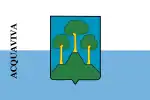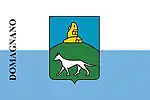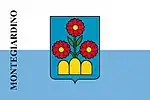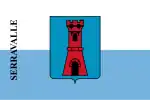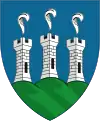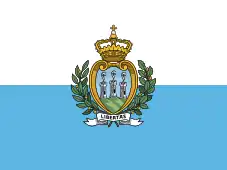 | |
| Use | National flag and ensign |
|---|---|
| Proportion | 3:4 |
| Adopted | 19th century (standardized on 22 July 2011) |
| Design | A horizontal bicolour of white and light blue; charged with the national coat of arms in the centre |
.svg.png.webp) | |
| Use | Civil flag and ensign |
| Proportion | 3:4 |
| Design | Plain white-blue bicolor. |

The flag of San Marino is formed by two equal horizontal bands of white (top) and light blue with the national coat of arms superimposed in the center; the coat of arms has a shield (featuring three towers on three peaks) with a closed crown on top, flanked by an oak and laurel wreath, with a scroll below bearing the word LIBERTAS (Freedom). The two colors of the flag represent peace (white) and liberty (light blue).[1]
Although the Law on the flag and coat of arms of San Marino from 2011 refers only to the "official flag" of the republic, a de facto civil flag, which omits the coat of arms, can sometimes be seen flying.[2] Some official sources of San Marino suggest that the civil flag is actually the bicolor with the coat of arms of the specific city it is used in, instead of the national one.[3]
The national ensign of San Marino is identical to the state flag.[4][5]
San Marino's municipalities all have flags that are very similar to San Marino's national flag. These flags all contain a shield-like emblem on the horizontal white and blue bicolor. Closest to the hoist of these flags is the name of the municipality written vertically.[6]
History

The oldest attested standard of the republic dates back from 4 September 1465, when it was commissioned from a manufacturer in Florence, allegedly composed of a tricolour of gold, white and "alessandrino" (thought to be purple, recently re-interpreted as a shade of azure).[7][8][9][10]
In 1797, most likely influenced by the wave of reforms in France, the Supreme Council of the Republic commissioned a white and blue cockade, which, coincidentally or not, was identical to the one used by the French revolutionaries.[11][12]
The decree of 6 April 1862 standardized the coat of arms, but did not mention the flag.[10][7]
| Flag | Year | Description |
|---|---|---|
 | 1465 | Battle standard. Hypothetical reconstruction according to Malagola. |
 | 1465 |
Battle standard. |
.svg.png.webp) | 1829 | Flag hoisted at the Guaita. First record of the use of a white-azure bicolour. |
.svg.png.webp) | –2011 |
Proportions and colors
The official proportion of the flag is 3:4, the coat of arms' width being 3⁄8 of the flag's length. While the arms are horizontally centered, their vertical position on the flag is defined by the location of the center of the cross on top of the crown: at 1⁄8 of the flag's length. The proportion of the coat of arms is 5:6.[13]
A 2:3 proportion can be used internationally and/or when specifically requested. In this case, the coat of arms' width is 1⁄3 of the flag's length, and the center of the cross on the top of the crown will be at 1⁄6 of the flag's height below the upper edge.
The colors of the flag are officially prescribed as follows: [13]
| Color/Color system | Pantone Coated | Pantone Uncoated | CMYK | Pantone TPX |
|---|---|---|---|---|
| Light blue on the flag | 2915 C | 2915 U | 55/10/5/0 | 15-4323 TPX |
| White | Pure white | Pure white | 0/0/0/0 | White textile |
| Sun yellow | 7406 C | 7404 U | 5/25/100/0 | 14-0852 TPX |
| Golden yellow | 124 C | 7405 U | 5/35/100/10 | 15-1050 TPX |
| Brown on branches | 7559 C | 7558 U | 15/35/70/30 | 18-0939 TPX |
| Green in the light | 576 C | 577 U | 47/10/70/0 | 17-0336 TPX |
| Green on leaves | 7742 C | 363 U | 65/25/80/13 | 18-0135 TPX |
| Green in the shadow | Cool gray 4 C + 7742 C or 350 C |
Cool gray 3 U + 363 U or 350 U |
65/25/80/50 | 14-4103 TPX + 18-0135 TPX or 19-6311 TPX |
| Sky blue on the shield | 291 C | 291 U | 47/8/7/0 | 14-4318 TPX |
| Blue in shadow | Cool gray 4 C + 291 C or 7698 C |
Cool gray 3 U +291 U or 7698 U |
70/30/20/20 | 14-4103 TPX + 14-4318 TPX or 18-4217 TPX |
| Gray in shadow | Cool gray 4 C | Cool gray 3 U | 0/0/0/30 | 14-4103 TPX |
| Black | Black C | Black U | 0/0/0/100 | Black TPX |
Political flags
Municipalities ("Castles")
Castles have their own flag, as indicated by March 28th 1997 decree n°40. Article 2 demands each name to be indicated vertically at the hoist in peigmot font, but it is not enforced and it is usual see hoisted unnamed flags at public offices.
See also
References
- ↑ About the Republic of San Marino Archived 2021-02-18 at the Wayback Machine, p. 6.
- ↑ The picture of a de facto civil flag of San Marino
- ↑ The Portal of the Republic of San Marino
- ↑ Law no. 164 from 30 November 2004 for the establishment of the National Registry of Recreational Vessels, article 7.
- ↑ The Civil Aviation and Marittime Navigation Authority
- ↑ San Marino Municipalities Flags
- 1 2 Repubblica di san marino segreteria di stato per gli affari interni. "Relazione illustrativa al progetto di legge costituzionale "Bandiera e stemma ufficiale della Repubblica di San Marino. Integrazione alla legge 8 luglio 1974 n. 59"".
- ↑ Malagola, Carlo (1891). L'archivio governativo della Repubblica di San Marino: riordinato e descritto : aggiunti gli statuti sammarinesi dal 1295 alla metà del secolo XIV (in Italian). Tip. Fava E. Garagnani. pp. 154–155.
- ↑ Casali, Verter. "Un errore del Malagola?". verter.altervista.org. Retrieved 2022-09-30.
- 1 2 Schmöger, Marcus E. V. "Arms and flag of San Marino". Nordisk Flaggkontakt. Nordic Flag Society. 53: 14–28.
- ↑ History of the flag of San Marino on rbvex.it
- ↑ Report on the Law project regarding the official flag and coat of arms of the Republic of San Marino
- 1 2 Consiglio Grande e Generale (22 July 2011). "BANDIERA E STEMMA UFFICIALE DELLA REPUBBLICA DI SAN MARINO" (PDF). Consiglio Grande e Generale (in Italian). pp. 3–4. Retrieved 29 September 2023.
